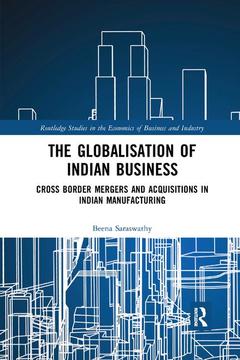The Globalisation of Indian Business Cross border Mergers and Acquisitions in Indian Manufacturing Routledge Studies in the Economics of Business and Industry Series
Auteur : Saraswathy Beena

Consolidation activities such as mergers and acquisitions (M&As) have been one of the major strategies adopted by Indian firms to withstand global competition. M&As experienced a substantial increase in value and volume during the post-liberalization era, facilitated by the presence of foreign subsidiaries in the Indian market as well as competitive pressure on domestic firms. The increased foreign investment through M&As brought new dimensions to the fore such as the implications on technological performance, efficiency, and more importantly, competition in the Indian market.
The Globalisation of Indian Business: Cross Border Mergers and Acquisitions in Indian Manufacturing provides an in-depth analysis of these issues, specifically aiming to understand whether the M&As strategies helped the firms to achieve their desired objectives in terms of improvement in technology, efficiency and market power in the context of the increase of M&As in India, using appropriate statistical and econometric techniques.
The book is of additional importance in the context of the recently implemented Competition Act, replacing the thirty year old MRTP Act in India. The new Act aims to maintain competition and protect consumers? interests without harming that of the producers?. Based on the analysis, broadly, the study cautions the regulators to rethink the efficiency defence argument and become more vigilant on the creation of monopolies. On the other side, it suggests firms should reconsider their post-merger integration strategy since consolidation has not led to a sustainable increase in market share of the surviving firms.
Contents
List of Tables and Figures
Abbreviations
I
Introduction
1.1
Introduction
1.2
Why Firms are Crossing Borders?
1.3
Opportunities and Challenges from Consolidation
1.4
Emerging issues…
References
Tables and Figures
II
Concepts, Evolution and Policy Points
2.1
Concepts of Mergers and Acquisitions
2.2
Mergers and Acquisitions in History: The Case of USA and UK
2.3
Government Intervention: Merger Regulations in India
2.4
The Deal Shaping Process
References
Tables and Figures
III
Cross-border Deals: Extent, Nature and Structure
3.1
An Overview of Global Scenario
3.2
Industry-wise Intensity of Cross-border Deals
3.3
Nature and Significance of Indian Deals
3.4
Foreign Acquisition of Indian Firms Abroad
3.5
Issues for Research
References
Tables and Figures
IV
M&As and Technological Performance
4.1
M&As and Innovation Creation
4.2
Innovation Concerns in the Competition Act
4.3
Data and Methodology
4.4
Beena Saraswathy is Assistant Professor at the Institute for Studies in Industrial Development (ISID), New Delhi. She has completed MPhil in Applied Economics and Doctoral Degree in Economics from Centre for Development Studies, Thiruvananthapuram, Kerala (Jawaharlal Nehru University, New Delhi). Before joining ISID, she had been working with Indian Council for Research on International Economic Relations (ICRIER) and Competition Commission of India (CCI) under the Ministry of Corporate Affairs (MCA), Government of India (GOI). Her research interests include market competition, mergers and acquisitions, the pharmaceutical industry, business groups in India and contemporary development issues.
Date de parution : 12-2019
15.6x23.4 cm
Date de parution : 10-2017
15.6x23.4 cm
Thèmes de The Globalisation of Indian Business :
- Finances / monnaie / crédit / banque / inflation / bourse
- Initiation à l'économie, théories et études économiques
- Économies et politiques économiques mondiales : relations économiques internationales / douanes, exportation
- Économies et politiques économiques nationales et régionales
- Gestion financière
- Droit des affaires / droit commercial / droit des sociétés
- analyse, budget, trésorerie, financement, investissement, gestion prévisionnelle
- organisation de l'entreprise, généralités
- direction / stratégie d'entreprise
Mots-clés :
Stochastic Frontier Production Function; Generalized Likelihood Ratio Tests; Pre-merger Period; Relevant Geographic Market; Post-merger Period; Relevant Product Market; Cross-border Deals; Vertical Deals; Technology Intensive Sectors; Conglomerate Deals; Disappeared Firm; Domestic Deals; Translog Production Function; Post-merger Integration; Cross-border Firms; Merger Waves; Horizontal Deals; Inefficiency Effects; Cross-border Purchases; Sectoral Policy Regulations; UK Merger; Prowess Database; Disappearance Rate; Human Resource Integration; Takeover Code



